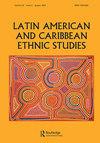Is Mexico beyond mestizaje? Blackness, race mixture, and discrimination
IF 0.6
Q4 ETHNIC STUDIES
引用次数: 3
Abstract
ABSTRACT In the 1980s and 1990s, a wave of multiculturalism swept across Latin America, following long-standing ideologies of mestizaje which glorified the region’s biological and cultural mixture and asserted that such mixture precluded the existence of racism. A decade or so later, countries in the region enacted another set of reforms focused on combatting ethnoracial discrimination and inequality. Whereas many view these changes as indicating the downfall of mestizaje ideologies, others argue that they may not be as distinct from mestizaje as it may appear. I reflect on this question in the context of Mexico, drawing on data from recent government and private surveys to assess the current state of Mexican national ideology, both at the national level and in a local site of blackness. I provide novel findings about the kinds and prevalence of various forms of black identification, the extent of black-indigenous boundary crossing, and the strength of attitudes about mestizaje and racism. Ultimately, I show how ideologies and discourses associated with mestizaje, multiculturalism, and racial equality are absorbed at the popular level in ways that suggest that at least some parts of the ideology of mestizaje are enduring or evolving to accommodate these new ethnoracial projects.墨西哥是否超越了梅斯蒂萨人?黑人,种族混合和歧视
在20世纪80年代和90年代,一股多元文化主义浪潮席卷了拉丁美洲,在此之前,长期存在的梅斯蒂扎伊意识形态美化了该地区生物和文化的混合,并声称这种混合排除了种族主义的存在。大约十年后,该地区的国家实施了另一套改革,重点是打击种族歧视和不平等。尽管许多人认为这些变化表明了梅斯蒂萨人意识形态的衰落,但也有人认为,它们可能并不像看起来那样与梅斯蒂萨人截然不同。我在墨西哥的背景下思考这个问题,利用最近政府和私人调查的数据来评估墨西哥国家意识形态的现状,无论是在国家层面还是在当地的黑人场所。我提供了关于各种形式的黑人认同的种类和流行程度的新发现,黑人-土著边界跨越的程度,以及对梅斯蒂扎伊人和种族主义的态度的力量。最后,我展示了与梅斯蒂扎伊人、多元文化主义和种族平等相关的意识形态和话语是如何在大众层面上被吸收的,这表明至少有一部分梅斯蒂扎伊人的意识形态正在持续或发展,以适应这些新的种族项目。
本文章由计算机程序翻译,如有差异,请以英文原文为准。
求助全文
约1分钟内获得全文
求助全文
来源期刊

Latin American and Caribbean Ethnic Studies
Social Sciences-Cultural Studies
CiteScore
1.30
自引率
16.70%
发文量
22
 求助内容:
求助内容: 应助结果提醒方式:
应助结果提醒方式:


